£11.87
Uncovering Greek Mythology: A Beginner’s Guide into the World of Greek Gods and Goddesses: 2 (Ancient History Books)
Unlock the Mysteries of Greek Mythology: The Ultimate Guide to Understanding Greek Gods, Goddesses, and Mythological Tales
Immerse yourself in the world of Greek mythology with our comprehensive guide, perfect for beginners and curious readers. This book is designed to make these ancient myths accessible and engaging, offering an enlightening journey through the fascinating realm of Greek gods and goddesses.
Why Should You Explore Greek Mythology?
Delve into these ancient stories and gain insights into:
The Origins of the Olympians: Uncover where the mighty gods and goddesses came from and how they shaped the world. Understand their origins, powers, and the mythological events that defined their roles.
The Overthrow of the Titans: Learn why the Titans were overthrown and the significance of this monumental event. Explore the dramatic tales of power struggles and divine battles.
Enduring Influence: Discover how Greek mythology has left a lasting impact on literature, art, and modern storytelling, resonating through centuries and continuing to inspire today.
What Will You Discover Inside?
Here’s a sneak peek of what’s inside:
Detailed Profiles of Major Gods and Goddesses: Meet Zeus, Poseidon, Aphrodite, and many more. Discover their powers, personalities, and stories. Each profile is crafted to provide a clear and concise understanding of these legendary figures.
Mythological Explanations for Natural Events: Learn how the Greeks used mythology to explain the world around them. From thunder to the changing seasons, uncover the stories behind natural phenomena.
Unveil the Secrets of Ancient Greece
Rich Mythological Stories: Explore the captivating tales of gods, goddesses, and mythical creatures. Each story is presented in an engaging narrative style, making it easy to follow and enjoy.
Inspiration and Wisdom: These stories not only entertain but also inspire and teach timeless lessons. Find parallels between ancient myths and modern life, gaining new perspectives on contemporary issues.
Journey Through Mythology: Start with the creation myth, meet the Titans, and encounter the Olympians and demigods. Follow the chronological journey through Greek mythology, understanding its evolution and significance.
Why This Book is a Must-Read
Comprehensive Guide: The most detailed and engaging guide to Greek mythology available. It covers all major and minor deities, offering a thorough understanding of their roles and stories.
Easy to Understand: Written in a clear and concise manner, perfect for readers of all ages. Whether you’re a student, a mythology enthusiast, or a curious reader, this book is designed to be accessible and informative.
What You’ll Learn
- The names, powers, and significance of all major Greek gods and goddesses.
- How to activate and use your knowledge of Greek mythology in modern contexts.
- Fascinating stories that showcase the Greeks’ worldview.
- The importance of mythology in Greek civilization and beyond.
- And much more!
Are You Ready to Dive into Greek Mythology?
This book is your key to unlocking the rich and fascinating world of ancient Greece. From the heights of Mount Olympus to the depths of the Underworld, discover the stories that have shaped human culture for millennia.
Take Action Now!
Scroll up and click “Buy Now” to start your journey into the enchanting world of Greek mythology!
| Dimensions | 12.7 × 0.97 × 20.32 cm |
|---|---|
| ASIN | B08QBY9HXR |
| Publisher | Independently published (10 Dec. 2020) |
| Language | English |
| Paperback | 152 pages |
| ISBN-13 | 979-8579611116 |
| Dimensions | 12.7 x 0.97 x 20.32 cm |
10 reviews for Uncovering Greek Mythology: A Beginner’s Guide into the World of Greek Gods and Goddesses: 2 (Ancient History Books)
Related products
Persians: The Age of The Great Kings
£7.49THE PERSIANS is a definitive new history of the Persian Empire, the world’s first superpower.
The Great Kings of Persia ruled over the largest Empire of antiquity, stretching from Libya to the Steppes of Asia, and from Ethiopia to Pakistan. At the heart of the Empire was the fabled palace-city of Persepolis where the Achaemenid monarchs held court in unparalleled grandeur. From here, Cyrus the Great, Darius, Xerxes, and their heirs passed laws, raised armies, and governed their multicultural Empire of enormous diversity.
The Achaemenids, however, were one of the great dysfunctional families of history. Brothers fought brothers for power, wives and concubines plotted to promote their sons to the throne, and eunuchs and courtiers vied for influence and prestige.
Our understanding of the Persian Empire has traditionally come from the histories of Greek writers such as Herodotus – and as such, over many centuries, our perspective has been skewed by ancient political and cultural agendas. Professor Llewellyn-Jones, however, calls upon original Achaemenid sources, including inscriptions, art, and recent archaeological discoveries in Iran, to create an authentic ‘Persian Version’ of this remarkable first great empire of antiquity – the Age of the Great Kings.
The Sumerian Civilization: An Enthralling Overview of Sumer and the Ancient Sumerians (History of Mesopotamia)
£10.49Ancient Mesopotamia’s legacy was truly revolutionary. Childlike pictures scratched into wet clay evolved into the first written language. The Mesopotamians wrote the first epic poems, the first hymns, the first histories, and the first law codes. They developed the first wheel for transportation; simple carts that hauled bricks or produce morphed into chariots racing along at thirty-five miles per hour.
They gazed at the sky and mapped it, observing the planets’ retrograde motions and predicting lunar and solar eclipses. They developed the concept of time, measurements, basic counting, higher math, and hydraulic engineering.
Mesopotamia gave birth to the world’s first great empires—the Akkadians, Assyrians, Babylonians, and Achaemenids—which stretched over three continents.
A glimpse at the questions this overview unpacks includes:
- How old is the world’s first city?
- How did the Eridu Genesis compare to Noah and the ark?
- How fast was the world’s first postal system?
- How many times did Babylon’s patron god Marduk get stolen?
- How did Hammurabi’s law code compare to the Law of Moses?
- Who calculated pi (π) to the value of 3.125 and understood the Pythagorean theorem twelve centuries before Pythagoras was born?
- Did Xerxes really have a million men in his army?
- Which empire encompassed 44 percent of the world’s population?
- What eunuch poisoned most of the Persian royal family?
- And much, much more!
Scroll up and click the “add to cart” button to learn the stories of incredible ancient Mesopotamia!
Mesoamerican Mythology: A Captivating Guide to Maya Mythology, Aztec Mythology, Inca Mythology, and Central American Myths (World Mythologies)
£13.55- Maya Mythology: Captivating Maya Myths of Gods, Goddesses and Legendary Creatures
- Aztec Mythology: Captivating Aztec Myths of Gods, Goddesses, and Legendary Creatures
- Inca Mythology: Captivating Inca Myths of Gods, Goddesses, and Legendary Creatures
- Central American Mythology: Captivating Myths of Gods, Goddesses, and Legendary Creatures of Ancient Mexico and Central America
In the first part of this book, you’ll find the following Maya myths and topics covered
- Two Creation Myths
- The Downfall of Seven Macaw
- The Boyhood Deeds of Hunahpu and Xbalanque
- Ballgames in Xibalba
- The Deaths and Resurrections of Hunahpu and Xbalanque
- The Man Who Became a Buzzard
- How the Sun and Moon Became Man and Wife
- Rabbit Gets His Drink
- And many more!
In the second part of this book, you’ll find the following Aztec myths and topics covered
- The Legend of the Suns
- The Deeds of Mixcoatl
- The Origin of Maize and the Creation of Pulque
- The Fall of Xochiquetzal
- The Fate of Souls
- Huitzilopochtli and the Founding of Tenochtitlan
- Huemac Plays the Ball Game
- And many more!
In the third part of this book, you’ll find the following Inca myths and topics covered
- Stories of the Gods
- Inca Political Myths
- Five Andean Folktales and an Inca Play
- And much, much more!
In the fourth part of this book, you’ll find the following Central American myths and topics covered
- Olocupinele Creates the World (Dule/Cuna, Panama)
- Watakame’ and the Great Flood (Wixáritari/Huichol, Mexico)
- Yomomuli and the Talking Tree (Yoeme/Yaqui, Mexico)
- How the Sea Was Made (Cabécar, Costa Rica)
- Mother Scorpion’s Country (Miskito, Nicaragua)
- The Childhood of the Sun and the Moon (qne-a tnya-e/Chatino, Mexico)
- The Invisible Hunters (Miskito, Nicaragua)
- The King of the Peccaries (Bribri, Costa Rica)
- How Opossum Stole Fire (Mazatec, Mexico)
- Uncle Rabbit and Uncle Tiger (Nicaragua)
- And much, much more!
So if you want to learn more about these four mythologies, click “buy now”!
Ancient Mesopotamia: An Enthralling Overview of Mesopotamian History, Starting from Eridu through the Sumerians, Akkadians, Assyrians, Hittites, and … Alexander the Great (History of Mesopotamia)
£11.73Ancient Mesopotamia’s legacy was truly revolutionary. Childlike pictures scratched into wet clay evolved into the first written language. The Mesopotamians wrote the first epic poems, the first hymns, the first histories, and the first law codes. They developed the first wheel for transportation; simple carts that hauled bricks or produce morphed into chariots racing along at thirty-five miles per hour.
They gazed at the sky and mapped it, observing the planets’ retrograde motions and predicting lunar and solar eclipses. They developed the concept of time, measurements, basic counting, higher math, and hydraulic engineering.
Mesopotamia gave birth to the world’s first great empires—the Akkadians, Assyrians, Babylonians, and Achaemenids—which stretched over three continents.
A glimpse at the questions this overview unpacks includes:
- How old is the world’s first city?
- How did the Eridu Genesis compare to Noah and the ark?
- How fast was the world’s first postal system?
- How many times did Babylon’s patron god Marduk get stolen?
- How did Hammurabi’s law code compare to the Law of Moses?
- Who calculated pi (π) to the value of 3.125 and understood the Pythagorean theorem twelve centuries before Pythagoras was born?
- Did Xerxes really have a million men in his army?
- Which empire encompassed 44 percent of the world’s population?
- What eunuch poisoned most of the Persian royal family?
- And much, much more!
Scroll up and click the “add to cart” button to learn the stories of incredible ancient Mesopotamia!
Whispers of the Ancients: The Genetic Secrets of the Balkans: Myths, DNA, and the Untold Story of the Balkans
£14.99Their origins, migrations, and the transformations of entire peoples are written into the bloodlines of the present. Beneath the myths and legends passed down through centuries lies something far older—fragments of history encoded within us, waiting to be uncovered. The past is not lost. It lives, hidden in the shadows of time, waiting for those who dare to look.

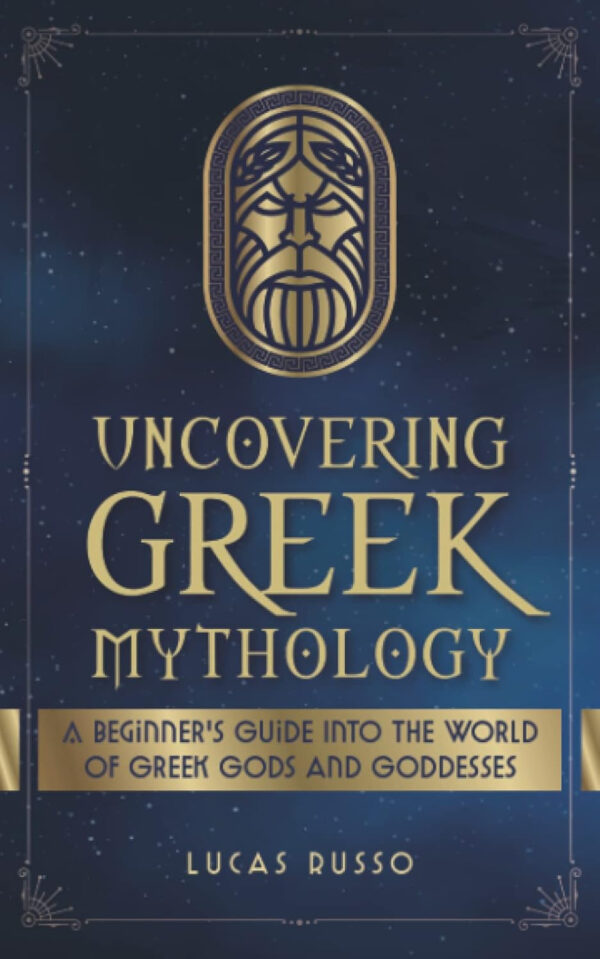
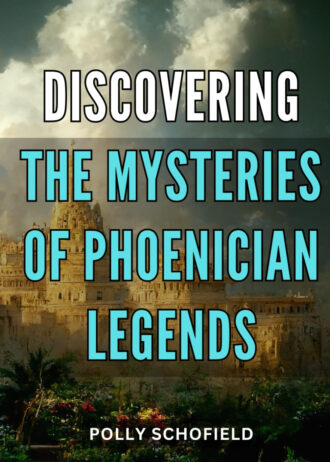

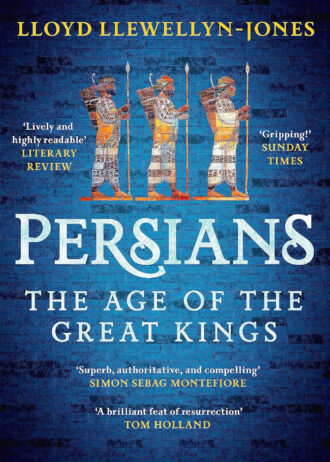
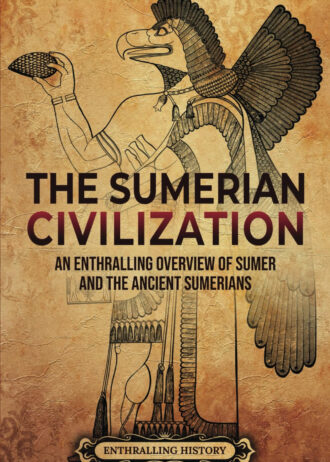
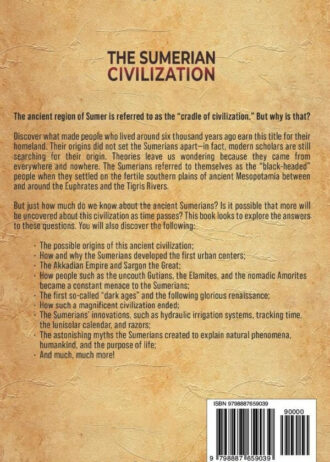
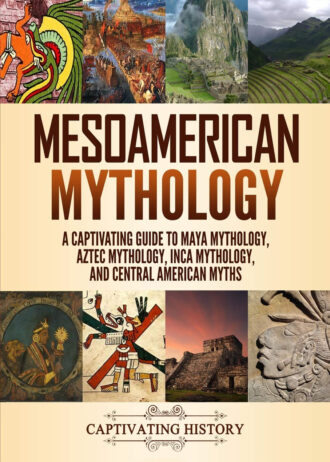
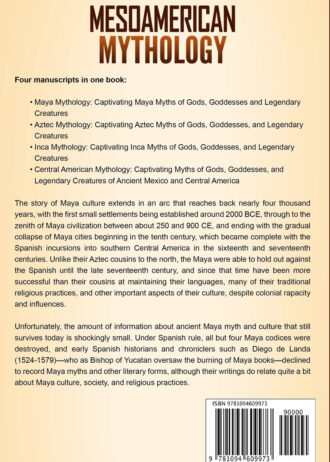
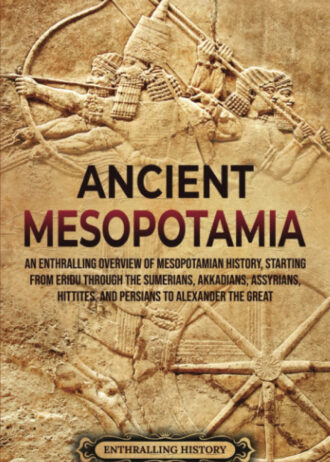
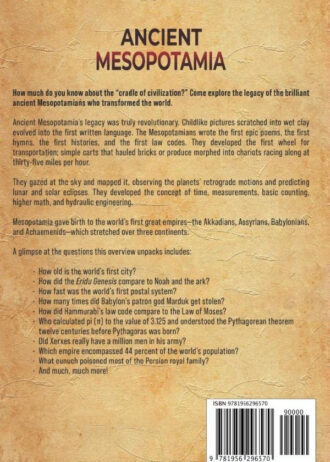
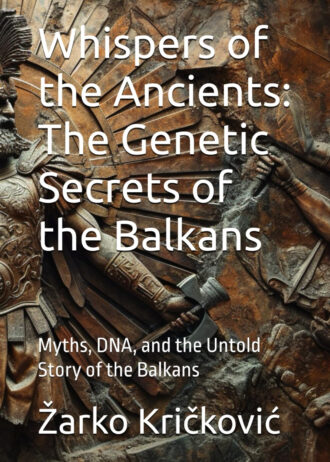
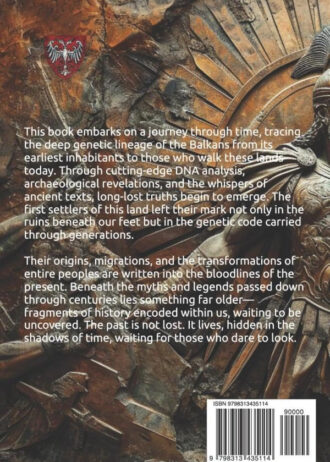
Iain –
Been so interested in Greek Mythology since i was a young lad.& from watching Clash of the Titans the original version not the remake.That’s when i was interested in more to learn about it.So this was my icing on the cake as they say.
tommy –
Really fanatic book. A smooth and enjoyable read. I’m very interested in Greek mythology and I learnt a lot reading this book
Angela May –
Okay so ~The book is very aesthetically pleasing. It’s thinner than I thought it would be but nonetheless it compacts a lot of information.If you’re looking for something not massively in depth then this is great. It’s not so much a “Greek mythology 101” (as I’d hoped it might be), but it does give a good starting point to the myths and gods and goddesses, as well as vital figures involved within those myths without going fully into them or overanalysing them. It’s light, easy to read. I started reading it a few hours ago (on and off to do other things) and will probably have finished it by tonight.For the most part, the authors analysing is fab. My only complaint is that it mentions about the green pantheon and Olympians as being a male patriarchal system. And this has been mentioned easily more than 5x within the book, then going on to speak about how the women are equally as important and superior in many ways and I just feel those kinds of opinions may not be necessary within this type of “Greek mythology for beginners” book. Maybe that’s just me looking for something more factual than opinionated, who knows!As someone who’s leaning toward Hellenic Polytheism (and in the very early stages of this), it’s been a great starting point to have an overview of the myths associated with the Gods and Godesses, as well as the titans and others.Overall, it’s a good book and worth the read if you’re just starting out! But for reasons I’ve listed I can only give it 4*.
Ellie S –
Lucas is a great author. His work is so easy to read and extremely pleasant too. I’ve struggled to enjoy other books on the Greek Gods due to how difficult they can be to read, and while they’re great for academics and the like I just wanted something easy to read that fit in with my interests and this more than fit the bill. I see people are commenting on the length of the book and how “the information in the book is what you can find online”. The length of the book is perfect for a beginners guide, and still gives tons of information on almost every aspect of the Gods. Regarding the availability of the information online, this is true. You have to remember though that being a historical and mythological subject, there isn’t much more information that can be discovered. This book brings everything together in a beautiful way. If you want “new” information about the Gods you’d be better delving into academic works where they may be showing new artifacts etc found from that time that could give more info. This book is written as a Beginners Guide and does a more than amazing job at it. Very excited to jump into the Norse Mythology book next.
Orlando Rebolledo –
As an avid fan of Greek Mythology, and always compelled by how it permeates Western culture and language, I was glad to come upon this book.The book is a primer to Greek Myth, though it does assume the reader has at least heard of the major myths and characters. Written in a didactic tone, though never veering toward the academic, Russo narrates the Greek Myths in the manner of a storyteller by a hearth, which is, poetically enough, how much of mythology proliferated.In his book, we explore not only the psychological, existential, and religious aspects of storytelling – tales that we now call myth but were once called fact, in a way – but the impact it has on a culture’s sense of morality, behavioral growth, and resultant claims to divinity. In myth, as reflected in Russo’s premise, we find the source, causation, and affinity of the Greek ethos toward philosophy and understanding of the world.The author elucidates on these themes while still indulging us with the characteristic charm of Greek Mythology. A short, succinct treat of a book.
rachel utton-said –
Just had the Greek mythology book by Lucas Russo delivered.What a disappointment!! Your average paper back book costs £7/£8. This is thinner than the average ( only 136 pages), poor quality covering and cost £14.!!!Nothing like I expected. Should be a gift, but won’t be giving as such, as too embarrassed.First time since “ever”I’ve really badly reviewed an Amazon item.But for the money this is shockingly poor!!!!
Not worth the money at all –
Not what I expected at all.
Krissie Dabrowski –
Tiny for the price. Thought there would be a list of gods and what they did. Not great for quick reference
Mau soto –
Best book for Greek Mythology lovers
Like other reviews say, it is in fact compact but powerful. This Greek Mythology book is an easy smooth read, with great detail and explanation on all there is to know about the Greek Gods and Goddesses and everything in between. I’ve been into greek mythology for a while now and this book went in depth into topics i didn’t really know much about, even when i thought i knew most of it. It is so interesting and engaging that you’ll probably finish it in one sitting. I highly recommend as a starter or as a concise overall book.
Melih –
Good and clear
This was my first book on greek mythology and it was such a pleasure to read it. The writing style was good and sometimes the author makes funny jokes which helps with reading the book. I think I have a good foundation on Greek mythology now.